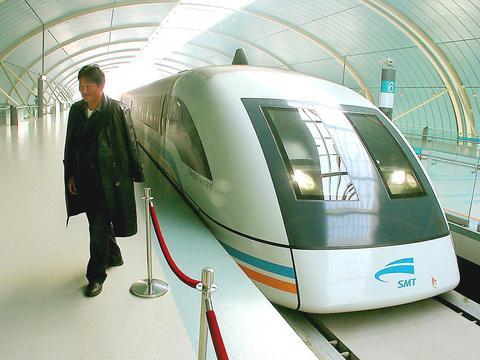Sleek, silvery and ready to fly, Shanghai's 430kph magnetic-levitation train began its daily commercial operation yesterdayday, shooting out of its station amid high hopes for better -- and much more expensive -- commuting.
The opening came a year and a day after German Chancellor Gerhard Schroeder visited Shanghai for the maiden voyage of the German-built project.

PHOTO: AP
The first train yesterday pulled out at 8:32am from Longyang Station with 10 passengers aboard for the 7-minute, 20-second whoosh of a journey -- 30 kilometers to Pudong International Airport.
The price of an economy seat is 75 yuan (about US$9), and VIP seats cost 150 yuan (about US$18). Trains will run every 20 minutes daily.
Security guards stood by at the entrance. Passengers were required to go through airport-style security to board. Digital signs monitored the speed for passengers.
Based on German technology, the US$1.2-billion train connects Shanghai to its 3-year-old airport, the city's second.
The system underwent nearly a year of testing since it made an inaugural experimental run on Dec. 31, 2002, carrying Schroeder and former Chinese Premier Zhu Rongji. More than 200,000 people have ridden the train in weekend test runs since then.
German companies spent decades and billions of dollars developing maglev technology, but had searched in vain for a customer until Shanghai leaders picked the system as a way to highlight the city's high-tech ambitions.
Some have criticized it as an expensive prestige project with limited usefulness.

The DBS Foundation yesterday announced the launch of two flagship programs, “Silver Motion” and “Happier Caregiver, Healthier Seniors,” in partnership with CCILU Ltd, Hondao Senior Citizens’ Welfare Foundation and the Garden of Hope Foundation to help Taiwan face the challenges of a rapidly aging population. The foundation said it would invest S$4.91 million (US$3.8 million) over three years to foster inclusion and resilience in an aging society. “Aging may bring challenges, but it also brings opportunities. With many Asian markets rapidly becoming super-aged, the DBS Foundation is working with a regional ecosystem of like-minded partners across the private, public and people sectors

BREAKTHROUGH TECH: Powertech expects its fan-out PLP system to become mainstream, saying it can offer three-times greater production throughput Chip packaging service provider Powertech Technology Inc (力成科技) plans to more than double its capital expenditures next year to more than NT$40 billion (US$1.31 billion) as demand for its new panel-level packaging (PLP) technology, primarily used in chips for artificial intelligence (AI) applications, has greatly exceeded what it can supply. A significant portion of the budget, about US$1 billion, would be earmarked for fan-out PLP technology, Powertech told investors yesterday. Its heavy investment in fan-out PLP technology over the past 10 years is expected to bear fruit in 2027 after the technology enters volume production, it said, adding that the tech would

YEAR-END BOOST: The holiday shopping season in the US and Europe, combined with rising demand for AI applications, is expected to drive exports to a new high, the NDC said Taiwan’s business climate monitor improved last month, transitioning from steady growth for the first time in five months, as robust global demand for artificial intelligence (AI) products and new iPhone shipments boosted exports and corporate sales, the National Development Council (NDC) said yesterday. The council uses a five-color system to measure the nation’s economic state, with “green” indicating steady growth, “red” suggesting a boom and “blue” reflecting a recession. “Yellow-red” and “yellow-blue” suggest a transition to a stronger or weaker condition. The total score of the monitor’s composite index rose to 35 points from a revised 31 in August, ending a four-month

RUN IT BACK: A succesful first project working with hyperscalers to design chips encouraged MediaTek to start a second project, aiming to hit stride in 2028 MediaTek Inc (聯發科), the world’s biggest smartphone chip supplier, yesterday said it is engaging a second hyperscaler to help design artificial intelligence (AI) accelerators used in data centers following a similar project expected to generate revenue streams soon. The first AI accelerator project is to bring in US$1 billion revenue next year and several billion US dollars more in 2027, MediaTek chief executive officer Rick Tsai (蔡力行) told a virtual investor conference yesterday. The second AI accelerator project is expected to contribute to revenue beginning in 2028, Tsai said. MediaTek yesterday raised its revenue forecast for the global AI accelerator used